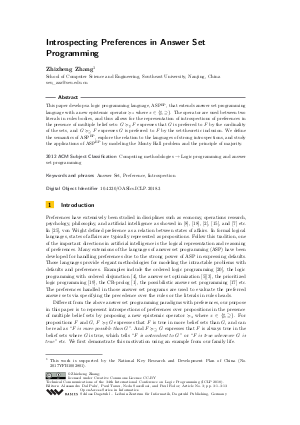Introspecting Preferences in Answer Set Programming
Author Zhizheng Zhang
-
Part of:
Volume:
Technical Communications of the 34th International Conference on Logic Programming (ICLP 2018)
Part of: Series: Open Access Series in Informatics (OASIcs)
Part of: Conference: International Conference on Logic Programming (ICLP) - License:
 Creative Commons Attribution 3.0 Unported license
Creative Commons Attribution 3.0 Unported license
- Publication Date: 2018-11-19
File

PDF
OASIcs.ICLP.2018.3.pdf
- Filesize: 457 kB
- 13 pages
Document Identifiers
Subject Classification
ACM Subject Classification
- Computing methodologies → Logic programming and answer set programming
Keywords
- Answer Set
- Preference
- Introspection
Metrics
- Access Statistics
-
Total Accesses (updated on a weekly basis)
0PDF Downloads0Metadata Views
Abstract
This paper develops a logic programming language, ASP^EP, that extends answer set programming language with a new epistemic operator >~_x where x in {#,supseteq}. The operator are used between two literals in rules bodies, and thus allows for the representation of introspections of preferences in the presence of multiple belief sets: G >~_# F expresses that G is preferred to F by the cardinality of the sets, and G >~_supseteq F expresses G is preferred to F by the set-theoretic inclusion. We define the semantics of ASP^EP, explore the relation to the languages of strong introspections, and study the applications of ASP^EP by modeling the Monty Hall problem and the principle of majority.
Cite As Get BibTex
Zhizheng Zhang. Introspecting Preferences in Answer Set Programming. In Technical Communications of the 34th International Conference on Logic Programming (ICLP 2018). Open Access Series in Informatics (OASIcs), Volume 64, pp. 3:1-3:13, Schloss Dagstuhl – Leibniz-Zentrum für Informatik (2018)
https://doi.org/10.4230/OASIcs.ICLP.2018.3
BibTex
@InProceedings{zhang:OASIcs.ICLP.2018.3,
author = {Zhang, Zhizheng},
title = {{Introspecting Preferences in Answer Set Programming}},
booktitle = {Technical Communications of the 34th International Conference on Logic Programming (ICLP 2018)},
pages = {3:1--3:13},
series = {Open Access Series in Informatics (OASIcs)},
ISBN = {978-3-95977-090-3},
ISSN = {2190-6807},
year = {2018},
volume = {64},
editor = {Dal Palu', Alessandro and Tarau, Paul and Saeedloei, Neda and Fodor, Paul},
publisher = {Schloss Dagstuhl -- Leibniz-Zentrum f{\"u}r Informatik},
address = {Dagstuhl, Germany},
URL = {https://drops.dagstuhl.de/entities/document/10.4230/OASIcs.ICLP.2018.3},
URN = {urn:nbn:de:0030-drops-98694},
doi = {10.4230/OASIcs.ICLP.2018.3},
annote = {Keywords: Answer Set, Preference, Introspection}
}
Author Details
Funding
- Zhang, Zhizheng: This work is supported by the National Key Research and Development Plan of China (No. 2017YFB1002801).
References
-
Marcello Balduccini and Michael Gelfond. Logic Programs with Consistency-Restoring Rules. In International Symposium on Logical Formalization of Commonsense Reasoning, AAAI 2003 Spring Symposium Series, pages 9-18, 2003.

- Ronen I. Brafman and Carmel Domshlak. Preference Handling - An Introductory Tutorial. AI Magazine, 30(1):58-86, 2009. URL: http://www.aaai.org/ojs/index.php/aimagazine/article/view/2114.
- Gerhard Brewka. Answer Sets and Qualitative Optimization. Logic Journal of the IGPL, 14(3):413-433, 2006. URL: http://dx.doi.org/10.1093/jigpal/jzl017.
- Gerhard Brewka, Ilkka Niemelä, and Tommi Syrjänen. Logic Programs with Ordered Disjunction. Computational Intelligence, 20(2):335-357, 2004. URL: http://dx.doi.org/10.1111/j.0824-7935.2004.00241.x.
- Gerhard Brewka, Ilkka Niemelä, and Miroslaw Truszczynski. Answer Set Optimization. In IJCAI-03, Proceedings of the Eighteenth International Joint Conference on Artificial Intelligence, Acapulco, Mexico, August 9-15, 2003, pages 867-872, 2003. URL: http://ijcai.org/Proceedings/03/Papers/125.pdf.
-
Luis Fariñas Del Cerro, Andreas Herzig, and Ezgi Iraz Su. Epistemic equilibrium logic. In Proc. 24th Int. Joint Conference on Artificial Intelligence (IJCAI-15), pages 2964-2970, 2015.

- James P. Delgrande, Torsten Schaub, Hans Tompits, and Kewen Wang. A Classification and Survey of Preference Handling Approaches in Nonmonotonic Reasoning. Computational Intelligence, 20(2):308-334, 2004. URL: http://dx.doi.org/10.1111/j.0824-7935.2004.00240.x.
- Carmel Domshlak, Eyke Hüllermeier, Souhila Kaci, and Henri Prade. Preferences in AI: An overview. Artif. Intell., 175(7-8):1037-1052, 2011. URL: http://dx.doi.org/10.1016/j.artint.2011.03.004.
- Wolfgang Faber, Gerald Pfeifer, Nicola Leone, Tina Dell'armi, and Giuseppe Ielpa. Design and Implementation of Aggregate Functions in the DLV System. Theory Pract. Log. Program., 8(5-6):545-580, November 2008. URL: http://dx.doi.org/10.1017/S1471068408003323.
- Martin Gebser, Benjamin Kaufmann, and Torsten Schaub. Conflict-driven Answer Set Solving: From Theory to Practice. Artif. Intell., 187-188:52-89, August 2012. URL: http://dx.doi.org/10.1016/j.artint.2012.04.001.
- Michael Gelfond. Strong Introspection. In Thomas L. Dean and Kathleen McKeown, editors, Proceedings of the 9th National Conference on Artificial Intelligence, Anaheim, CA, USA, July 14-19, 1991, Volume 1., pages 386-391. AAAI Press / The MIT Press, 1991. URL: http://www.aaai.org/Library/AAAI/1991/aaai91-060.php.
- Michael Gelfond. Logic Programming and Reasoning with Incomplete Information. Ann. Math. Artif. Intell., 12(1-2):89-116, 1994. URL: http://dx.doi.org/10.1007/BF01530762.
-
Michael Gelfond. New semantics for epistemic specifications. In Logic Programming and Nonmonotonic Reasoning, pages 260-265. Springer, 2011.

-
Michael Gelfond and Yulia Kahl. Knowledge Representation, Reasoning, and the Design of Intelligent Agents. Cambridge Unversity Press, 2014.

- Judy Goldsmith and Ulrich Junker. Preference Handling for Artificial Intelligence. AI Magazine, 29(4):9-12, 2008. URL: http://www.aaai.org/ojs/index.php/aimagazine/article/view/2180.
- Patrick Kahl, Richard Watson, Michael Gelfond, and Yuanlin Zhang. A Refinement of the Language of Epistemic Specifications. Journal of Logic and Computation, 2015. URL: https://doi.org/10.1093/logcom/exv065.
- Pascal Nicolas, Laurent Garcia, Igor Stéphan, and Claire Lefèvre. Possibilistic uncertainty handling for answer set programming. Ann. Math. Artif. Intell., 47(1-2):139-181, 2006. URL: http://dx.doi.org/10.1007/s10472-006-9029-y.
- Gabriella Pigozzi, Alexis Tsoukiàs, and Paolo Viappiani. Preferences in artificial intelligence. Ann. Math. Artif. Intell., 77(3-4):361-401, 2016. URL: http://dx.doi.org/10.1007/s10472-015-9475-5.
- Chiaki Sakama and Katsumi Inoue. Prioritized logic programming and its application to commonsense reasoning. Artif. Intell., 123(1-2):185-222, 2000. URL: http://dx.doi.org/10.1016/S0004-3702(00)00054-0.
- Torsten Schaub and Kewen Wang. A semantic framework for preference handling in answer set programming. TPLP, 3(4-5):569-607, 2003. URL: http://dx.doi.org/10.1017/S1471068403001844.
-
Steve Selvin. A problem in probability (letter to the editor). American Statistician, 29:67, 1975.

-
Yi-Dong Shen and Thomas Eiter. Evaluating epistemic negation in answer set programming. Artificial Intelligence, 237:115-135, 2016.

-
Yidong Shen, Kewen Wang, and Thomas Eiter. FLP answer set semantics without circular justifications for general logic programs. Artificial Intelligence, 213:1-41, 2014.

-
Mirosław Truszczyński. Revisiting epistemic specifications. In Logic programming, knowledge representation, and nonmonotonic reasoning, pages 315-333. Springer, 2011.

- G. H. Von Wright. The logic of preference reconsidered. Theory and Decision, 3(2):140-169, 1972. URL: http://dx.doi.org/10.1007/BF00141053.
